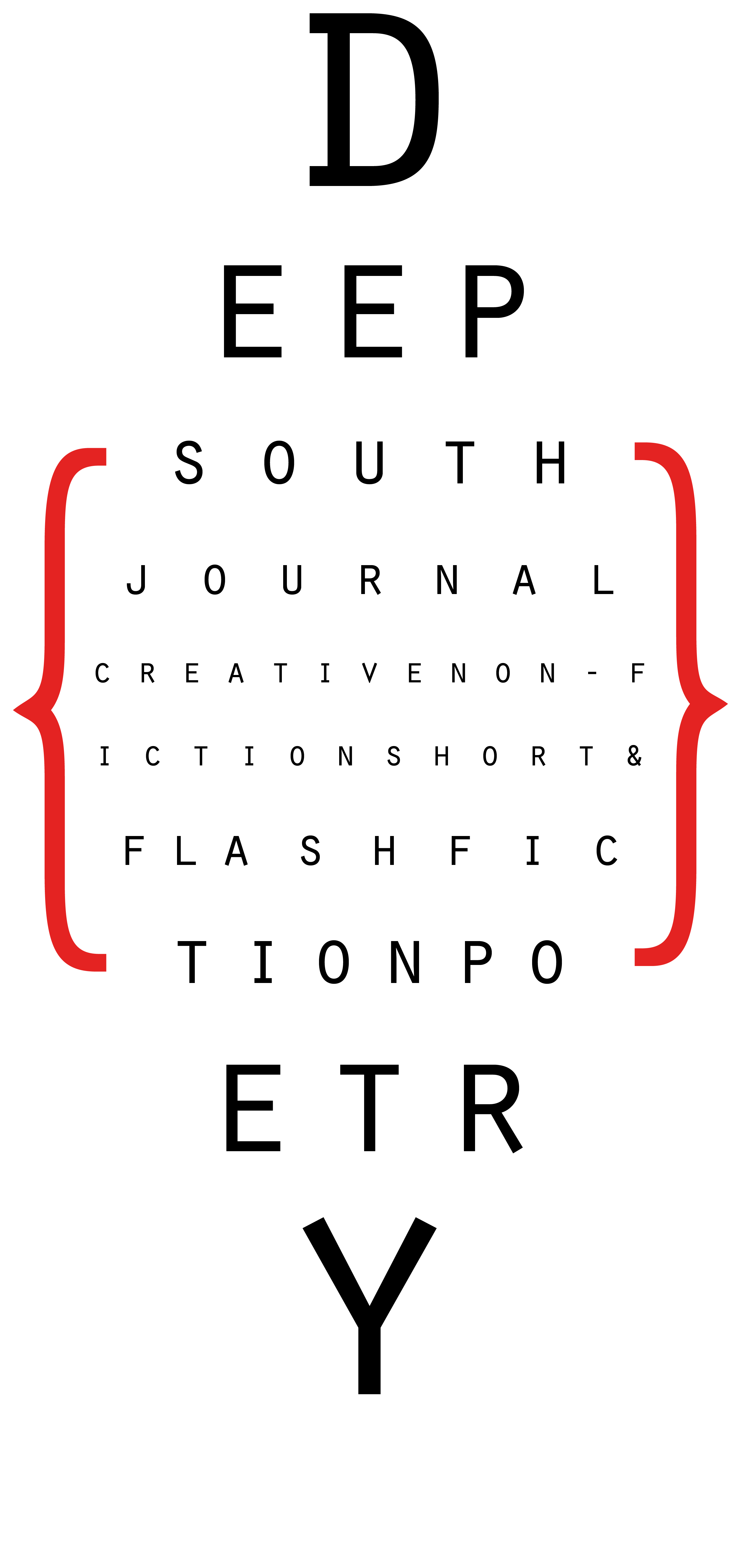deep south 2013
{ }
dsj fiction
The Other Side of Sunshine
They sit on brown couches, drinking. Sherry for them, pineapple juice for Sophie. The vodka from last night at Dan's still hazes the edges of Sophie's thoughts, but, for now, she is sixteen.
Juice sipped and ankles crossed.
She remembers the way her nipples rose and pressed against the shine of her dress when the ice spilled last night. But here she is, with Grandma, George and Thea, on a Friday night when the street lamps glow lonely because the air has crisped the wings of the fireflies.
Let's say you were in Mogadouro, says George.
Mogadouro, Sophie thinks.
That's Portugal.
Yes.
Then where we are now—
Nelson.
Yes—we would be directly opposite. Its antipodes.
Ah, says Sophie.
Antipodes. An-ti-po-des. It stumbles over the tongue. Pleasant, like a rock tripping. Hot-skipping over a pond. Antipodes.
Grandma, George and Thea sip. The sherry would roll, thick, spicy like a cinnamon stick over their tongues, Sophie thinks. Sharp and warm, the early spring sun hitting the backs of newly naked legs. Blue-white in the light. Pink-white in bed. Dan's bed. But Sophie's mind is straying. She pulls it back, hand over hand, until it sits. Stays. The brown couch with her on it.
Yes, says Thea. We are the opposite of Mogadouro, and it of us.
Maybe them, they, some people, are there, in Mogadouro, sitting, sipping, discussing the same. Nelson, they will say. And the same words, almost, but ravelled in other embroideries, other images of legs, will wind through the minds of the granddaughter, girl, another Sophie who sits and sips with them. With a half a mind because the other half won't sit too.
I am the opposite of you, that other half of mind says. Grandma, George and Thea. They are old, with wrinkles like fat wax rolling, with wisps of sugar candy hair that was made grey by mistake. Or left with bits of white. While Sophie is tight, and young (she hopes), and has someone who wants to smell the shampoo on her hair. The hair of the other three might smell of lavender in old pillows. Or of dust on a wind.
Grandma, George and Thea are lonely for the colonies, the places that spat them up on the tarmac roads of this island with only their bodies and their ideas of what makes the world hold light. And darkness.
Ice cubes in pineapple juice cloud like pebbles in a fish tank. Dirty fish tank. Sophie sucks, makes them dirtier. And asks for more so she can keep her tongue plunged in the cold. She, unlike the three others, thinks nothing of the tarmac and of breathing this air. And she has yet to decide what darkness is.
Khartoum, Grandma says. That makes me think of Khartoum.
Why, Sophie says but doesn't say. She hears it echo in her head, sharp like a beak tapping, but won't give it the life curiosity would give. Curiosity given when ignorance would do. But—
Yes, says Thea. Khartoum. My mother had pictures, carpets. There were marble floors that would reflect your face and other things as well. For the men watching when there was a skirt. A short skirt and legs spread.
Ah, says Grandma. And she looks at Sophie. They sip to stop the story. Sophie is glad. She likes stories of open skirts and men with eyes, but only when they come from her mouth. The mouths of other Sophies too. She doesn't want to hear them from others. Old people and men.
Tanganyika! George says and he rolls his head back, sits it like a dried scalp on the brown couch bulge. His onion paper head with white onion hairs sprouting. Pickled onion breath. But even Sophie doesn't mind this breath. Doesn't mind the soft rot seeping. It, after all, is only a reminder of what he was.
Tanganyika, says Grandma as well. They talk of these lost times, lost places, like pinheads on a map that must be remembered to be captured. Conquered with a tiny paper flag. Catch them before they slip. Because the young won't have these colonies to remember one day. They will have other places to breathe into their bones, to talk of over sherry and juice.
The dirt, Grandma says. The dirt was so red. My brother's hands were wet and the dirt ran red on his palms.
Red dirt, red. Sophie is thinking red, but another red. Red of Dan's mouth when it closes over hers. Sticky bitter with beer. And her mouth sticky back. Tongues that slide. She wonders if Grandma, Thea, George ever had that stick. But she can only think of their mouths as the slight damp of spit on tissue paper. Dry tongues, chaste lips.
My father died of the sleeping sickness in Tanganyika, says Thea. She sips sherry. This is a tongue twister, but not quite. In this room, the words sleeping sickness have a sluggish power. Not bored sluggish, but heavy buzzing. Like when you are in a car before the engine starts, alone, with all the doors shut. When you must move and make a noise before silence becomes too high-pitched. But Sophie doesn't move. Doesn't say words, because all the word space in the air is taken up by the other three. Pressed down by warm wool heater smell.
Well my father—says Grandma.
Your father, says George.
Now he was a true Edwardian gentleman. In India. A policeman for the British. And even when he was on patrol in the desert—
What is now Kashmir? Says Thea. Pakistan?
Yes, says Grandma. Even when he was in the desert he would always have his tea at six o'clock sharp. With a dinner jacket, white starched tablecloth and polished silver pot.
Sophie can only see this man, this great-grandfather, as wrapped in white now. With silver dripping down his chin, instead of the lukewarm tea. She knows this picture is wrong, it doesn't have the stiffness expected, the stiffness of all the English men in textbooks. But then they can be wrong too, the paper they are printed on could be the only stiffness they are made of. What paper is the grandfather, the father, printed on for Grandma? Sophie wonders. But there are walls of air separating them, Sophie and Grandma, in this room. Walls of air and years and they are standing on the opposite ends of life, weaving weak ropes of words to span the distance.
Yes, every day he had tea that way, Grandma says. Even when there was no one to see him done up in that dinner jacket. And she turns her eyes sad so that they are the mirror-pools for the right words of this moment.
Sophie avoids those words and turns her eyes up. Above George's head. Where there is a cream canvas hanging with blue acrylic smears, like toddler prints but more. The type of painting called Post-modern with a capital P. When you look hard enough, there is a girl, hidden in the smears and made of smears herself. A blue girl in a blue world. Sophie wonders if it is lonely in that world and if that girl would wonder about loneliness too if she were looking back at Sophie. Because Sophie can be lonely. Especially in this room with the spaces. No Dan here, but then even with him there are spaces. Spaces where hips don't quite fit together and where hands don't know to touch.
I'm thinking of writing my memoirs, says Grandma.
Aren't we all, says George. Not a question.
Because when I'm gone I want there to be something left, says Grandma.
Sophie doesn't know if words can really be left. And if they can belong to a world when the life that became them is gone.
She wonders if Grandma has felt some things. The breath-heat, stomach-leap when dancing under kaleidoscope lights. Blurred, jumping air that sweats. She wonders if Grandma knows what it feels like to be pressed up against a clock tower wall at night in winter. A boy, like Dan, kissing her breasts, his mouth leaving behind wet cold spots. They are waiting for the clock to chime. Waiting on the other side of sunshine, the sky sucking black night before dawn steals it away.
Yes, says Grandma. I should get on to writing one of these days.
Sophie wants that cold of the kisses and at the same time doesn't want it with every hot pulse of blood in her.
As Grandma sips now, her throat-skin wobbles soft. Powdered flesh flaps that Sophie wants to touch. And though Sophie hears in her mind the unfairness of her own thoughts, it is as if Grandma's eyes have never seen, her skin never felt, anything as real as the clock tower against skin. As if there is nothing more real in her world than the milk-white of weak English tea and the empty colours, textures, of worlds far away that mean only hollows of dust to these brown couches in this room. Here. And Sophie feels the dust settle on her own eyes as well, no matter how she tries to stir it.
Things have changed, sighs Thea. Kashmir, just a war zone. Khartoum too. Tanganyika.
Well.
Sophie knows. And she knows Dan might smell of onions like George, and it could be her telling of carpets and skirts. This could frighten her but it doesn't tonight, doesn't pop the bubble of what she thinks of love hidden somewhere beneath, where kidneys could be. White hot. And cold, all at once.
One day, on another brown couch, Sophie won't know how to say this hot-cold. Won't know how to give her world to others, just like the three now who are anchored in their places. But she will do it all the same. She will try to cup steam in her fingers, trap spice on her tongue.
There is a wind outside and it presses against the windows and the house heat. Body heat. Dark leaf shapes framed in dark sky press too. Shadow sketches of a world apart from the burn in the glasses of Grandma, George and Thea. Shadows and dark sent by the sun that would be shining in Mogadouro at that moment. It chases them and their thoughts.
More sherry? George asks, and pours. Thick amber in the light.
Nairobi, says Thea. As if it is the last place on a long list. Now that is somewhere I want to go back to.
No you don't, says George. You think you do.
Thea doesn't argue back.
Dan, says Sophie. Dan in her head. That is where she wants to go back to, right now rather than being in this room. Back with him no matter what colours are made when their stomach-skins press hard together. And even with a future-George sitting there in that thought, she still wants it. She wants to have the chance to make the stories that mean nothing to anyone but her. Make her own antipodes and frame memories in false colours. Drag her own invented tints through the waters, construct another blue girl of smears.
Grandma, George and Thea comb their fingertips through their lost lands, catching things to cast into the light. Sophie sits with a whole mind now, a whole mind knowing she can't know because the touch of air on skin in each place will have some different breath. A different sigh. This is why those places are lost. Swallowed. The red won't be the red that it was. Neither will the dust, the marble, the men with eyes. Looking eyes. And there are no more white tablecloths in once-Pakistani, now-Indian deserts because Sophie won't see them.
So.
Here they all sit, on brown couches. Swallowing spice to ward off the darkness sent by Mogadouro. On the other side of sunshine.
Bonnie Etherington was born in Nelson, grew up in Indonesia, and currently resides in Palmerston North. She recently completed a Master's degree in Creative Writing through Massey University.



